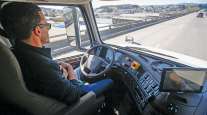Boston’s Self-Driving Vehicle Startups Fed Up With Regulations

Top automakers and tech companies are warning state officials the current regulations for testing self-driving cars may be too burdensome and could make it too hard or even impossible to test in Massachusetts, a move experts say would delay the economic and safety benefits expected from autonomous vehicles.
“Getting to a fully self-driving car requires a lot of testing to build the necessary foundations for safe deployment. Testing on real streets provides concrete data necessary for safe deployment and for good planning,” said Alison Pascale, senior policy analyst for Audi, adding self-driving cars will require cities to make infrastructure improvements.
“If testing is slowed through overly burdensome regulations that make testing too onerous, cities won’t have access to the best information for their investment decisions,” Pascale said.
Two companies are currently testing autonomous vehicles here, nuTonomy and Optimus Ride, which were both born out of the Massachusetts Institute of Technology. Another, international auto parts company Delphi, plans to begin testing later this year.
All three are testing in Boston, and are guided by a step-by-step testing program that allows the companies to test in larger and denser areas as they hit certain milestones. Both Optimus Ride and nuTonomy were initially confined to the Raymond L. Flynn Marine Park, and have now driven roughly 600 miles combined.
RELATED: Autonomous ships are setting sail in Boston
“Restricted test zones create awkward logistical challenges for vehicle testing that hinder safe system developments,” said Jane Lappin, director of government affairs and public policy for TRI. “These restrictions on when, where or how testing can occur should be avoided.”
Toyota set up its Toyota Research Institute in Cambridge last year — a $1 billion initiative focused on automation and robotics — and praised the area’s technical talent and access to MIT. But TRI has not begun testing AVs in Massachusetts, instead opting to collect and analyze mapping data from sensors mounted to a human-driven car. Toyota tests AVs in other parts of the country, including Michigan.
Willam Messner, a professor at Tufts University, said companies likely wouldn’t hesitate to move testing operations elsewhere if necessary.
“Why would they take a chance? It’s not like they don’t have other places to test that might even be easier,” Messner said. “There’s a trade-off; you don’t want to put the public unnecessarily at risk, but on the other hand, delaying the deployment of these vehicles is putting the public at risk.”
Daniel Sullivan, a policy analyst with MassDOT, said the state is creating testing procedures “that will work for everybody.”




